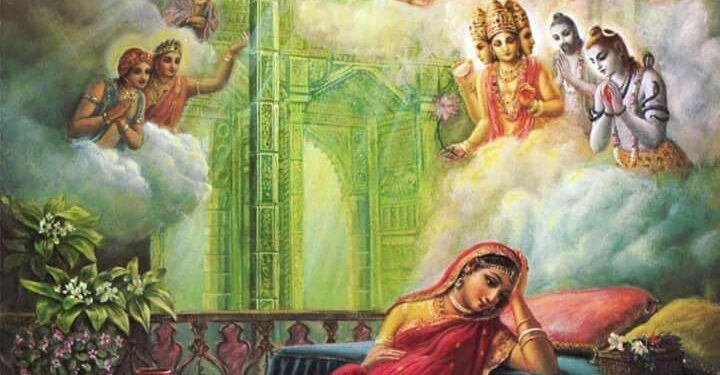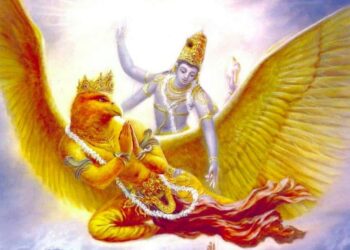The highest blunder committed by the impersonalists is to think that when the incarnation of God comes He accepts the form of matter in the mode of goodness. Actually, the form of Kṛṣṇa or Nārāyaṇa is transcendental to any material idea. Even the greatest impersonalist, Śaṅkarācārya, has admitted, nārāyaṇaḥ paro ’vyaktāt: the material creation is caused by the avyakta (impersonal) manifestation of matter, or the nonphenomenal total reservoir of matter, but Kṛṣṇa is transcendental to that material conception. That is expressed in Śrīmad-Bhāgavatam as śuddha-sattva, or transcendental goodness. He does not belong to the material mode of goodness, and He is above the position of material goodness. He belongs to the transcendental, eternal status of bliss and knowledge.
“Dear Lord, when You appear in Your different incarnations, You take different names and forms according to different situations. Lord Kṛṣṇa is Your name because You are all-attractive; You are called Śyāmasundara because of Your transcendental beauty. Śyāma means ‘blackish,’ yet it is said that You are more beautiful than thousands of Cupids (kandarpa-koṭi-kamanīya). Although You appear in a color which is compared to the blackish cloud, because You are the Transcendental Absolute, Your beauty is many, many times more attractive than the delicate body of Cupid. Sometimes You are called Giridhārī because You lifted the hill known as Govardhana. You are sometimes called Nandanandana or Vāsudeva or Devakīnandana because You appear as the son of Mahārāja Nanda or Vasudeva or Devakī. Impersonalists think that Your many names or forms are given according to a particular type of work and quality because they accept You from the position of a material observer.
“Our dear Lord, the way of understanding is not to study Your absolute nature, form and activities by mental speculation. One must engage himself in devotional service; then one can understand Your absolute nature and Your transcendental form, name and qualities. Actually, only a person who has a little taste for the service of Your lotus feet can understand Your transcendental nature or form and qualities. Others may go on speculating for millions of years, but it is not possible for them to understand even a single part of Your actual position.” In other words, the Supreme Personality of Godhead, Kṛṣṇa, cannot be understood by the nondevotees because there is a curtain of Yogamāyā which covers Kṛṣṇa’s actual features. As confirmed in the Bhagavad-gītā, nāhaṁ prakāśaḥ sarvasya [Bg. 7.25]. The Lord says, “I am not exposed to anyone and everyone.” When Kṛṣṇa came, He was actually present on the Battlefield of Kurukṣetra, and everyone saw Him. But not everyone could understand that He was the Supreme Personality of Godhead. Still, everyone who died in His presence attained complete liberation from material bondage and was transferred to the spiritual world.
“O Lord, the impersonalists or nondevotees cannot understand that Your name is identical with Your form.” Since the Lord is absolute, there is no difference between His name and His actual form. In the material world there is a difference between form and name. The mango fruit is different from the name of the mango. One cannot taste the mango fruit simply by chanting “mango, mango, mango.” But the devotee who knows that there is no difference between the name and the form of the Lord chants Hare Kṛṣṇa, Hare Kṛṣṇa, Kṛṣṇa Kṛṣṇa, Hare Hare / Hare Rāma, Hare Rāma, Rāma Rāma, Hare Hare and realizes that he is always in Kṛṣṇa’s company.
For persons who are not very advanced in absolute knowledge of the Supreme, Lord Kṛṣṇa exhibits His transcendental pastimes. Such persons can simply think of the pastimes of the Lord and get full benefit. Since there is no difference between the transcendental name and form of the Lord, there is no difference between the transcendental pastimes and the form of the Lord. For those who are less intelligent (like women, laborers or the mercantile class), the great sage Vyāsadeva wrote the Mahābhārata. In the Mahābhārata Kṛṣṇa is present in His different activities. The Mahābhārata is history, and simply by studying, hearing and memorizing the transcendental activities of Kṛṣṇa, the less intelligent can also gradually rise to the standard of pure devotees.


















